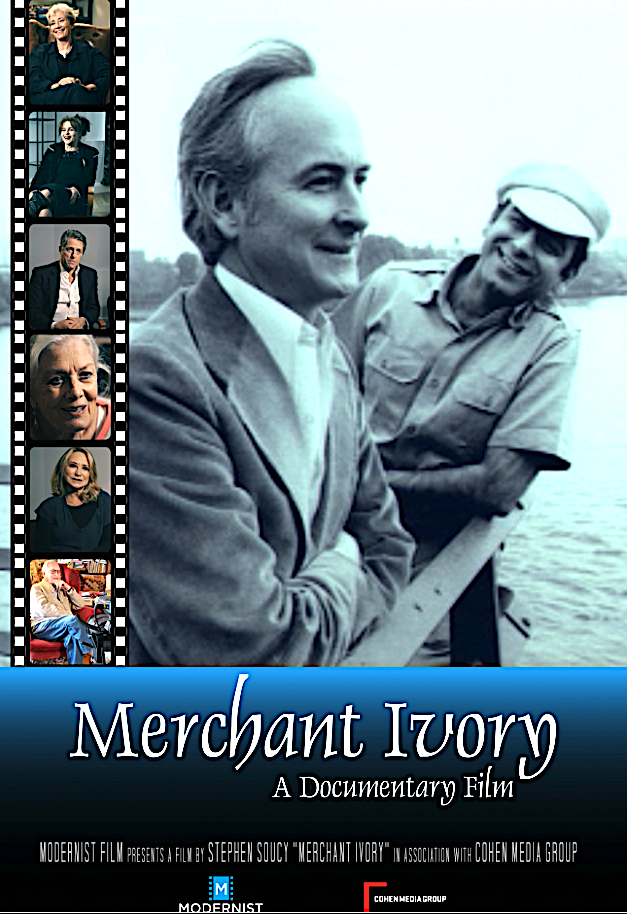By Robert St. Martin
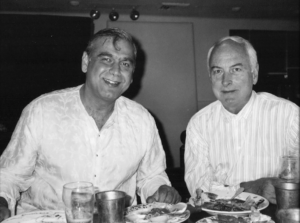
Los Angeles, CA (The Hollywood Times) 8/26/24 – Opening this Friday at the Laemmle Royal Theatre in West Los Angeles will be the much-anticipated documentary Merchant Ivory, written and directed by Stephen Soucy. The film has been to a number of film festivals including Palm Springs, Frameline, and Tribeca. This is an intimate look at the important award-winning partnership of James Ivory and Ismail Merchant in their 40 years together making movies in India, England, Europe, and the United States. James Ivory is an American film director, producer, and screenwriter. Ivory along with Indian film producer Ismail Merchant, his domestic as well as professional partner, and screenwriter Ruth Prawer Jhabvala, were the principals, along with composer Richard Robbins, in Merchant Ivory Productions.
Together Ismael Merchant and James Ivory made film adaptations from the novels of E.M. Forster, Henry James and Kazuo Ishiguro. Their body of work is celebrated for its elegance, sophistication, literary fidelity, strong performances, as well as its complex themes and rich characters. Merchant–Ivory was established in 1961in India where Ivory and Merchant began making modestly budgeted films including The Householder (1963), Shakespeare-Wallah (1965) and Bombay Talkie (1970) – with Ruth Prawer Jhabvala as the scriptwriter.

Ivory began adapting films from classic novels such as Henry James’ The Europeans (1979), Quartet (1979), Heat and Dust (1984), E.M. Forster’s Maurice (1987) and Mr. & Mrs. Bridge (1990). During this period, James Ivory was nominated for the Academy Award for Best Director for A Room with a View (1985), Howard’s End (1992) and The Remains of the Day (1993). At the age of 89, Ivory won the Academy Award for Best Adapted Screenplay for his work on Luca Guadagnino’s Call Me By Your Name (2017).
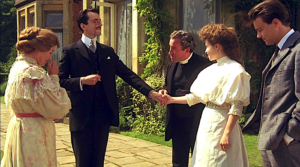
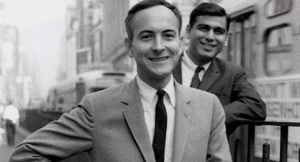
For all the fine work with period films that takes place in England, it is interesting to note that not a single member of the core quartet who made up the company was British at all. Ivory was American, originally from Oregon and the adopted son of an Oregon lumber baron who studied architecture at the University of Oregon and later filmmaking at USC. Ismail Merchant was from a moneyed Muslim family in Mumbai in India and had made a few movies himself in India. Ivory met producer Ismail Merchant at a screening of Ivory’s early documentary The Sword and the Flute at a screening in New York City in 1959. Two weeks later, they were spending all their time together.
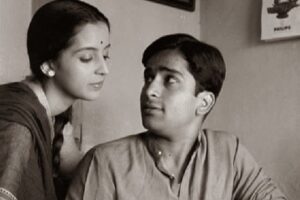
Ruth Prawer Jhabvala who wrote or adapted many of their major films was a German Jew (whose family fled Germany in 1939) who had gone to live in India after her marriage. In 1963, Jhabvala was approached by James Ivory and Ismail Merchant to write a screenplay for their debut The Householder, based on her 1960 novel. Composer Richard Robbins was from Massachusetts and taught at Boston University. A chance meeting in 1975 between Robbins and Jhabvala – who was looking for a piano teacher for her daughter – led to a partnership that lasted almost thirty years. Jhabvala introduced Robbins to Merchant, and the two quickly became close friends.
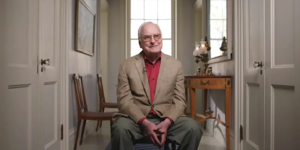
Because James Ivory is still alive at age 96, director Stephen Soucy had almost unfettered access a few years ago to James Ivory, who recounts his turbulent relationship with his creative partner and lover, Ismail Merchant. Ruth Prawer Jhabvala provided the screenplays for the early works and Merchant roped in people such as Indian cinema legends Subrata Mitra and Satyajit Ray in getting the work completed as economically as possible. There is an incredible history just going over those early works, which featured legendary Bollywood actors like Shashi Kapoor and people such as Felicity Kendal in her first screen role – essentially playing a heavily fictionalized version of herself in Shakespeare-Wallah at age 17.
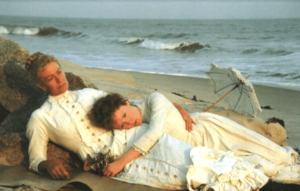
Helena Bonham Carter, whose career was made (and in her mind also hampered) by 1985’s A Room with a View. A deeply irascible Vanessa Redgrave talks about her work with them on The Bostonians and Howard’s End. An enthusiastic and loving Emma Thompson speaks about how Ismail was the mercurial magician and chaotic haggler who fed everyone but tried his best not to pay them and comparing that energy to James’ calm vision.
The two men were very different. James Ivory was the calm director who studied every detail. Thompson (an actress who hates being given notes from a director) praises Ivory for his inability to give false praise after he told her they needed another take, as he was “bored” by the first. Ismail Merchant was the more animated of the two; a big personality who knew how to get things done as a producer. As Anthony Hopkins states, “He could charm the birds out of the trees.”
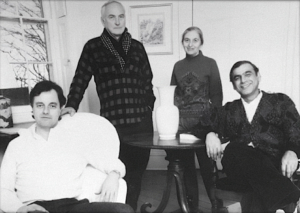
Merchant-Ivory were a family – an often-dysfunctional one powered by Ismail’s conman impresario genius, James Ivory’s keen eye which came from his time studying architecture and props, Ruth Prawer Jhabvala’s fierce intellectualism, and Richard Robbins’ seemingly light but often complex scores combining minimalism with lush symphonies. Merchant Ivory is a studied celebration of both the successful career and lasting love/partnership between two men who lived their lives and made their films to their own standards.
Merchant and Ivory’s personal relationship, the intricacies of what kept them together are effective, as the film’s revelations move beyond the glamour of being filmmakers and into the realities of decades spent as a gay couple. As Ivory explains, for both men, there were dalliances with other partners, but nothing shook the foundations of what the two men built together. Ismael Merchant seems to have a long-standing relationship with the composer Richard Robbins, who later had an affair with actress Helena Bonham Carter. On the other hand, it seems that James Ivory had an affair the travel writer and novelist Bruce Chatwin.
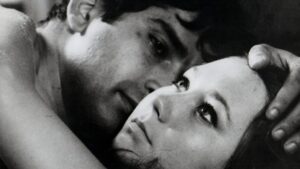
Although they were lovers until Ismail’s untimely death in 2005, their relationship, although known, was never publicly acknowledged until many years later because of Ismail’s Muslim religious background. Until Ismail Merchant’s death in 2005, Ismail Merchant and James Ivory lived together in their New York country home in upstate New York from 1975 – a paradise for artists of all sexualities where ideas, friendships, and romantic relationships thrived. The wealth of information contained in this absorbing picture is refreshingly illuminating and inspiring for both film connoisseurs and the LGBTQ+ communities, the latter of which James Ivory has become an icon.
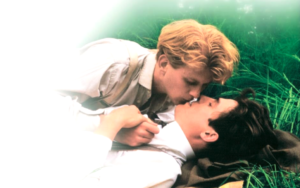
The film examines the craft of Merchant Ivory in detail, focusing more on their more well-known and commercially successful films. We are treated to cameos appearances by so many actors and craftsmen who worked on their films: Samuel West, Julie Christie, Greta Scacchi, Lee Remick, Thandiwe Newton, Nick Nolte, Julian Sands, Daniel Day-Lewis, Rupert Graves, James Wilby, Denholm Elliott, Simon Callow, Maggie Smith, Isabelle Adjani, Prunella Scales (mother of Samuel West), Natasha Richardson (daughter of Vanessa Redgrave), Christopher Reeve, Ralph Fiennes, Paul Newman, Joanna Woodward, Robert Sean Leonard, Kyra Sedgewick, Blythe Danner, Anthony Hopkins, and of course, Hugh Grant, whose career they made with Maurice.
Ruth Prawer Jhabvala refused to adapt Forster’s Edwardian set Maurice (1987) for them and passes it on to another writer – Kit Hesketh-Harvey. The film that James Ivory was most proud of, because it celebrates gay joy and heartbreak, was seen by Ruth to be too slight to bother with. However, she did create a specific plot point which explains why Hugh Grant’s Clive Durham ends his relationship with James Wilby’s Maurice. After seeing Lord Risley’s trial shows him the severity of the punishment and ostracization due if discovered to be gay, it finally pushes Clive to choose the safety of traditional marriage that was typical of the early 20th century.
Greta Scacchi, James Wilby, Samuel West, and others, including Hugh Grant, acknowledge how the often-fractious couple of James Ivory and Ismail Merchant created art that reflected their experiences as outsiders looking in. I was fortunate as a film goer years ago to see the Indian Films of Merchant Ivory and was completely seduced by the beauty of their films and the brilliance of the screenplays. The came all those beautifully staged and brilliantly acted period dramas based on the sublety of Henry James’ novels and the issues raised in E.M. Forster’s novels that cemented my appreciation for the art and craft of Merchant Ivory.
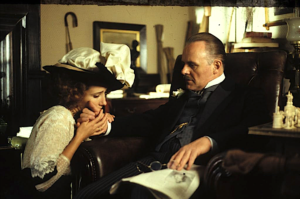
“Only connect!” is a line from Howard’s End spoken by Emma Thompson’s Margaret Schlegel – an intellectual woman who sits at the center of Leonard Bast’s poverty and Henry Wilcox’s industrial wealth. Actor Rupert Graves applies this line to what Merchant Ivory were trying to do with their films: Connect people with the vast treasures and tragedies of life while living on the margins.


